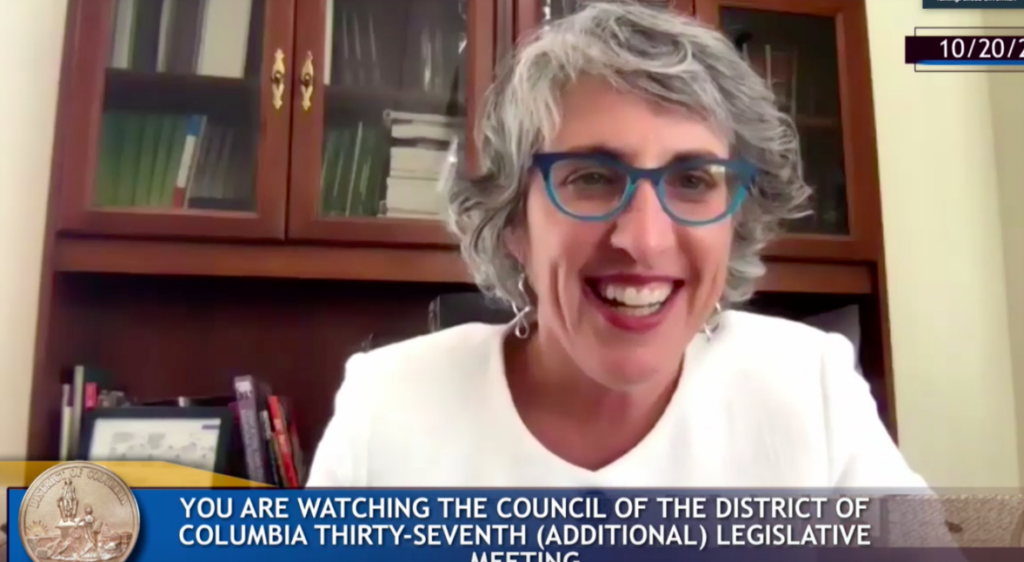For D.C. residents on unemployment benefits, temporary relief is coming in the form of a seven-week extension of benefits.
Unemployment benefits for the first group of residents who applied under the pandemic unemployment assistance program (PUA) were set to expire on Oct. 25.
However, the D.C. Council took emergency action, voting unanimously on Oct. 20 to extend PUA benefits for seven weeks, providing relief through December for residents who applied for unemployment at the start of the pandemic. Anyone whose PUA expires before the end of this year will be eligible for an extension for up to seven weeks, ending on Dec. 31.
Since late January, some 40,000 workers have lost income due to the COVID-19 pandemic and are currently on PUA, according to At-large Councilmember Elissa Silverman, who introduced the bill. The PUA program, which was created as part of the federal CARES Act, is designed to provide unemployment insurance-like benefits for workers who would not qualify for traditional unemployment insurance, including gig workers, freelance workers, contractors, and anyone who files taxes using a 1099 form, classifying them as “self-employed.” Some workers in the hospitality industry are also classified as self-employed or contractors, preventing them from having access to traditional unemployment.
The first group of those who filed for PUA were set to hit the end of the 39 weeks of benefits before the end of October, which Silverman called a “financial cliff,” on the other side of which they would receive no unemployment benefits from the government. With the emergency legislation Silverman introduced, however, those benefits, at a minimum of $179 per week, will be extended for an additional seven weeks and fully funded by the federal government.
“We know that unemployment compensation is the best way to keep families who have lost a job or income in some sense of stability,” Silverman said at the council session.
Benefits will also be extended for any residents on traditional unemployment insurance (UI) and its associated programs, whose benefits are set to expire. As of Oct. 26, 152,000 people have filed for unemployment since March, according to the D.C. Department of Employment Services website. D.C. does not automatically extend these benefits for qualifying workers, who will have to apply for the seven-week extension with DOES.
The new benefits are possible because Silverman’s bill amended existing legislation used during the 2008 financial crisis to trigger extra federal aid during periods of high unemployment to apply in 2020 as well. High unemployment is defined as 8%, and D.C.’s unemployment rate is currently 8.7%.
This legislation is the culmination of a month of discussions around extending benefits, and whether residents know they can access those benefits. DOES currently does not notify an individual, whether they are on PUA or UI and its associated programs, that their benefits are about to run out. Though Silverman pushed for both these notifications and an automatic extension of benefits at a hearing on unemployment services on Sept. 30, DOES Director Unique Morris-Hughes was skeptical the department had the technical infrastructure to make that happen.
In that hearing, Morris-Hughes also responded to criticisms leveled against her department in a seven-hour-long public hearing on Sept. 16. Several workers shared stories of waiting weeks or months after first contacting DOES to receive unemployment benefits, and others said their benefits stopped with no explanation. Those who tried to file claims via the mobile site were unable to get through, and help was not provided in Amharic, according to Ethiopian workers who tried to file claims. Workers whose claims were approved are struggling to receive back pay for dates between when they lost work and when their claim was approved.
“I applied for DOES insurance on April the 22nd. I didn’t hear back from them until May the 30th,” said Thomas Kennerly, who spent over three months trying to obtain PUA. Kennerly said he received a series of documents over the month of June, and did not receive any benefits until July. Then, he received another email from DOES. “This email said if I didn’t provide a document in 20 minutes they would close out my case,” Kennerly said. Kennerly was one of over 50 workers who spoke to difficulties in obtaining PUA or UI at the panel.
According to Morris-Hughes, 60 claims adjudicators with the DOES have provided benefits to 89,000 people as of Sept. 30, meaning tens of thousands of claims are still being processed. This does not include claims for back pay, which are not processed automatically. A combination of an antiquated system, handling requests from out-of-District workers, and constantly changing federal guidelines have made the process lengthy, she said.
“We are working as hard as we can to resolve every claim quickly and expeditiously,” she said.
This additional aid will go into effect once the bill is approved by the mayor and DOES sets up the capability to distribute the benefits. A temporary version of the bill, which can stay in place longer than the emergency version passed last week, is also under council review. The discussion about unemployment benefits is likely to resume again before the end of the year, when all CARES Act programs, including PUA, are set to expire.








